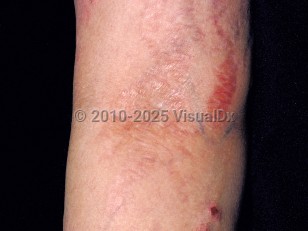Steroid atrophy in Child
See also in: External and Internal EyeAlerts and Notices
Important News & Links
Synopsis

Codes
L90.9 – Atrophic disorder of skin, unspecified
SNOMEDCT:
79983002 – Steroid atrophy
Look For
Subscription Required
Diagnostic Pearls
Subscription Required
Differential Diagnosis & Pitfalls

Subscription Required
Best Tests
Subscription Required
Management Pearls
Subscription Required
Therapy
Subscription Required
Drug Reaction Data
Subscription Required
References
Subscription Required
Last Updated:01/27/2025

